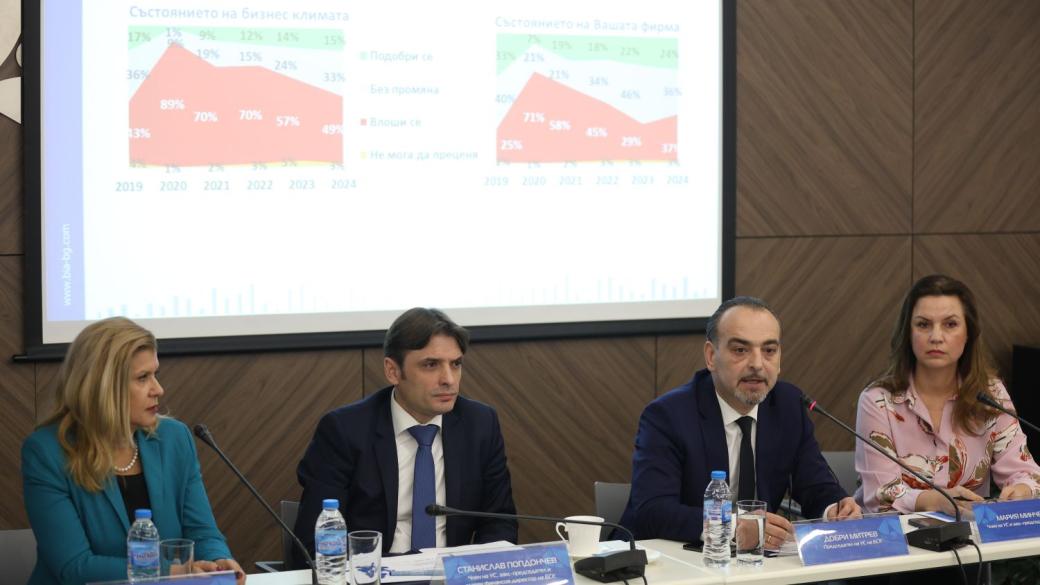Bulgarian businesses expect more regulations, costs and inflation in 2025
Finding qualified workers continues to be the number one problem for companies in the country

© ECONOMIC.BG / BTA
Higher prices, more costs and more regulations. Bulgarian businesses are heading into the new year expecting these conditions, according to data from the annual survey by the Bulgarian Industrial Association (BIA), presented during a press conference on Monday.
According to the survey, conducted among nearly 740 businesses between November 5 and December 6, over 40% of respondents expect Bulgaria to experience an economic downturn in 2025.
These negative sentiments have been present at a relatively stable level over the last few years, with the only exception being the pandemic year of 2020 when the share of pessimists rose to 70 percent.
Overall, business sentiment regarding trends for 2025 is pessimistic, regardless of the specific indicators. Over 80% of companies surveyed expect higher energy and raw material prices, another 90% expect higher wage costs, and 67% are preparing for greater regulatory burdens.
Nearly 70% believe that inflation in the country will accelerate next year.
At the same time, for the third consecutive year, there has been an increase in optimistic expectations, with one-third of Bulgarian companies heading towards 2025 with positive expectations.
Expectations are mostly negative, the growth in optimism somewhat corresponds to the desire of enterprises to develop," Dobri Mitrev, Chairman of the Board of Directors of the Bulgarian Industrial Association, offered his reading of the situation.
He explained the lingering sense of pessimism with the experience from the last 2-3 years and the impact of crises, including the pandemic, high energy prices, the war in Ukraine, and "the lack of short-term prospects for resolving these situations."
Another factor is the lack of partnerships between businesses and institutions.
Our immature political class, which should at least try to match the intelligence of Bulgarian citizens and the opportunities before us all, as well as the public’s desire to have a stable government that will undertake reforms and measures to push us off the bottom, make business extremely cautious and pragmatic in its expectations for 2025," Mitrev explained.
Salaries as a major business expense in 2025
Overall, respondents expect that next year there will be a rise in prices, including the cost of labor, with most employers (83%) planning to increase wages. Only 13% expect them to remain at the same level, and 4% have not yet decided.
Over half of them (56%) plan to increase their production volumes and nearly 50 percent will expand their offerings with new products and services.
These plans are conditioned by the expected increase in the minimum wage. "The first reaction to the increase in the minimum wage was that the salaries of those with higher salaries would also increase, and some companies said that they would have to increase the price of the goods and services offered. This year there is already a tendency to abandon planned investments," said Maria Mincheva, Deputy Chairwoman of the Bulgarian Association of Industrialists.
According to the survey, 33% of respondents will include the labor cost surge in the price of their goods and services and 16% will be forced to increase all salaries, while 11% can afford a pay increase only for those employed on a temporary basis.
"Businesses cannot be restricted from planning new investments because of administrative decisions," said Mincheva.
The lack of workforce is still a serious problem
Access to people remains a very serious problem for Bulgarian businesses," said Mincheva.
Two other challenges are bureaucracy and the regulatory burden.
Political instability has been a leading problem for the fourth year in a row. This is also evident from the fact that the National Assembly has 0% trust rating among the businesses," Mincheva added.
According to Mitrev, the municipal and tax authorities are those that are most in contact with the entrepreneurs.
Enterprising people create added value and fill the treasury but do not have the necessary support from state institutions," said Mitrev, adding that "businesses are maybe not yet recognized by the institutions as a partner in the overall development of the national economy."
In addition, 49% of the companies believe that the Bulgarian economy has deteriorated this year, while only 15% report an improvement. For comparison, in 2023, the optimists were 14% and the pessimists were 57% of the total.
Budget 2025 is like a restaurant bill
The BIA also commented on the draft budget for 2025, with Mitrev pointing out that it creates serious risks for the country's financial stability.
No one is convinced that the revenue measures will be implemented to the extent that they are planned," said Mitrev, likening the budget to a "restaurant bill."
He made an analogy saying that it was like walking into a restaurant, seeing one price on the menu, and another on the final bill, but still being forced to pay. In his words, this was “terrifying because both Bulgarian citizens and Bulgarian businesses have already paid their dues to the treasury.”
If these measures are approved in their current form, this will mean new inflation," predicted Mitrev.
Translated by Tzvetozar Vincent Iolov

 Simona Gotsova
Simona Gotsova 


